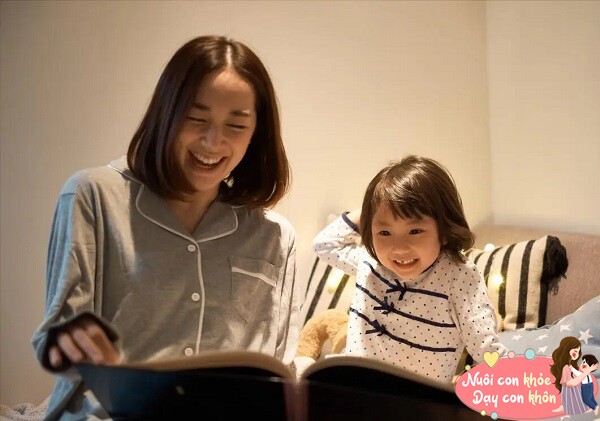Some babies may start saying simple words like “mama” or “dada” very early on, while others may take a little longer to develop speech.
However, regardless of when infants start talking, they can understand what adults are saying from a very early age. Babies are capable of recognizing their parents’ voices and intonation even before they are born.
After birth, they continue to develop their ability to recognize sounds and language through daily conversations. In fact, infants can understand some simple words and phrases before they are able to speak.


How many months does it take for a baby to understand what adults are saying?
Research has found that newborns can distinguish the rhythm of sounds within 72 hours of birth and can assess emotions through voice by the time they are 3 months old. Infants’ ability to understand language is much earlier and stronger than we think.
Can babies “eavesdrop”? The primitive awareness stage from 0-3 months
Although a newborn’s eyes remain closed at birth, their ears are already functioning. The first cry in the delivery room is the beginning of breathing, as well as the activation of the language reception system.
Newborns are particularly sensitive to their mother’s “heartbeat and voice”. If the baby cries during the postpartum confinement period, playing prenatal music can quickly soothe them. Babies at this stage are like a “tape recorder”, recording every gentle voice of the mother.
The Harvard Center for Child Development has tracked and indicated that parents who have more non-verbal communication with their children have kids with language abilities 20% higher than their peers by the age of three. Few people know that gentle touching, exaggerated facial expressions, and intimate interactions with the baby are all “adding bricks and tiles” to their language development.

Babies are particularly sensitive to their mother’s “heartbeat and voice”
Why do 6-month-old babies suddenly seem smarter? Beware of the “language trap” in the semantic development stage
At this stage, your baby may start to follow simple commands like “raise your hand” and “bye-bye”, which is also a sign of the beginning of the “Semantic Blooming Stage”
The most amazing change at this stage is that babies start to associate sounds with meanings.
When you say “Deng Deng”, the baby will look up at the ceiling.
If you say “Look, a cat”, the baby will turn towards the animal.
However, parents should pay special attention to their speech and actions during this stage to avoid the baby imitating inappropriate language. Use clear and precise words when communicating with your baby.

Use clear and precise words when communicating with your baby.
The language explosion stage at 18 months: The golden window for cognitive development
During this stage, your baby’s vocabulary will grow exponentially, and they will use simple words and sentences to express their needs.
Experiments conducted at the University of Manchester have confirmed that infants who are regularly read to before the age of two have 18% higher gray matter density in the language region of the brain than their peers.
At this stage, parents can do the following to stimulate their baby’s language and cognitive development:
– Choose colorful books and let your baby match pictures with pronunciations, thus doubling the learning effect.
– Spend about 1 hour interacting + 30 minutes reading together + learning 10 new vocabulary words every day.
Avoid using repetitive words like “eat” and “sleep”, and instead use more dialog-based questions, such as: “Do you want to eat an apple or a banana?” This stimulates your baby’s thinking and expression.

Use more dialog-based questions with your baby.
The logic-building stage of a 2-year-old: Transitioning from “less talking” to “less arguing”
When your child starts asking questions like “Why can’t I eat candy?”, it means they have entered the logic-building stage.
At this point, you can introduce more complex language games like role-playing and storytelling, while encouraging your child to express themselves in complete sentences. Be patient and let your child take their time to organize their thoughts and language.
The American Academy of Pediatrics recommends that daily conversations between parents and children at this stage should include more than 5 open-ended questions.

6 skills for raising a “language genius”
Once you understand the laws of language development in children, the next step is to seize the important periods of language development and do your best to create a “little language genius” who can speak eloquently.
Here are 6 helpful tips suggested by experts for parents:
Create a loop
Constant language stimulation can increase gray matter density in the brain.
So, talk to your baby all the time. Whether it’s changing their diaper or taking them for a walk, talk about anything and everything you see and think – “Now, mom is using warm water to wipe your face, does it feel comfortable?”, “Look at the blue sky, red flowers, and birds flying”…

Use exaggerated expressions and gestures
When talking to your baby, it’s not just about talking a lot, but also about talking effectively. You can use exaggerated facial expressions and gestures to increase your baby’s interest in learning.
For example, when talking about “an elephant”, you can imitate a long trunk, and when talking about “a rabbit”, you can point to your ears. This will triple your baby’s memory retention.
Ask questions and provide choices
“Do you want to wear blue socks or yellow socks?” Such choice-based questions can activate the prefrontal cortex of the baby’s brain, forcing them to think and organize their thoughts before answering.

Use exaggerated expressions and gestures to increase your baby’s interest in learning.
Keep reading to help your baby learn faster
Studies have found that babies who are read to daily for three months have a 67% larger vocabulary than those who are not.
Therefore, try to read to your baby for about 20 minutes every day. This will help establish associations between images and text, while also improving their focus and learning speed.
Create more opportunities for your baby to talk
Create more opportunities for your baby to interact with peers. Communication between infants includes a lot of imitation, modification, and creativity, which are catalysts for language development.

Create more opportunities for your baby to talk.
Praise and encourage your baby more
Don’t worry if your baby doesn’t speak perfectly. First, praise them, and then gently correct their mistakes to protect their confidence in expressing themselves.
With your love, patience, and dedication, any child can become a “language genius”






























